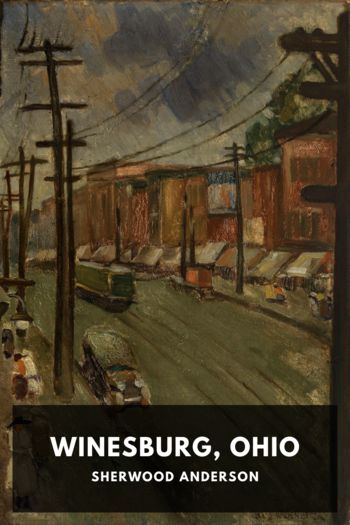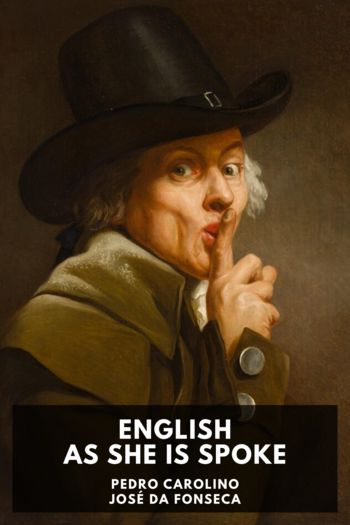Winesburg, Ohio, Sherwood Anderson [web based ebook reader txt] 📗

- Author: Sherwood Anderson
Book online «Winesburg, Ohio, Sherwood Anderson [web based ebook reader txt] 📗». Author Sherwood Anderson
Had you been in the earlier years of your life a citizen of the village of Winesburg, Ohio, there would have been for you no mystery in regard to the beast in his cage. “It is like Wash Williams,” you would have said. “As he sits in the corner there, the beast is exactly like old Wash sitting on the grass in the station yard on a summer evening after he has closed his office for the night.”
Wash Williams, the telegraph operator of Winesburg, was the ugliest thing in town. His girth was immense, his neck thin, his legs feeble. He was dirty. Everything about him was unclean. Even the whites of his eyes looked soiled.
I go too fast. Not everything about Wash was unclean. He took care of his hands. His fingers were fat, but there was something sensitive and shapely in the hand that lay on the table by the instrument in the telegraph office. In his youth Wash Williams had been called the best telegraph operator in the state, and in spite of his degradement to the obscure office at Winesburg, he was still proud of his ability.
Wash Williams did not associate with the men of the town in which he lived. “I’ll have nothing to do with them,” he said, looking with bleary eyes at the men who walked along the station platform past the telegraph office. Up along Main Street he went in the evening to Ed Griffith’s saloon, and after drinking unbelievable quantities of beer staggered off to his room in the New Willard House and to his bed for the night.
Wash Williams was a man of courage. A thing had happened to him that made him hate life, and he hated it wholeheartedly, with the abandon of a poet. First of all, he hated women. “Bitches,” he called them. His feeling toward men was somewhat different. He pitied them. “Does not every man let his life be managed for him by some bitch or another?” he asked.
In Winesburg no attention was paid to Wash Williams and his hatred of his fellows. Once Mrs. White, the banker’s wife, complained to the telegraph company, saying that the office in Winesburg was dirty and smelled abominably, but nothing came of her complaint. Here and there a man respected the operator. Instinctively the man felt in him a glowing resentment of something he had not the courage to resent. When Wash walked through the streets such a one had an instinct to pay him homage, to raise his hat or to bow before him. The superintendent who had supervision over the telegraph operators on the railroad that went through Winesburg felt that way. He had put Wash into the obscure office at Winesburg to avoid discharging him, and he meant to keep him there. When he received the letter of complaint from the banker’s wife, he tore it up and laughed unpleasantly. For some reason he thought of his own wife as he tore up the letter.
Wash Williams once had a wife. When he was still a young man he married a woman at Dayton, Ohio. The woman was tall and slender and had blue eyes and yellow hair. Wash was himself a comely youth. He loved the woman with a love as absorbing as the hatred he later felt for all women.
In all of Winesburg there was but one person who knew the story of the thing that had made ugly the person and the character of Wash Williams. He once told the story to George Willard and the telling of the tale came about in this way:
George Willard went one evening to walk with Belle Carpenter, a trimmer of women’s hats who worked in a millinery shop kept by Mrs. Kate McHugh. The young man was not in love with the woman, who, in fact, had a suitor who worked as bartender in Ed Griffith’s saloon, but as they walked about under the trees they occasionally embraced. The night and their own thoughts had aroused something in them. As they were returning to Main Street they passed the little lawn beside the railroad station and saw Wash Williams apparently asleep on the grass beneath a tree. On the next evening the operator and George Willard walked out together. Down the railroad they went and sat on a pile of decaying railroad ties beside the tracks. It was then that the operator told the young reporter his story of hate.
Perhaps a dozen times George Willard and the strange, shapeless man who lived at his father’s hotel had been on the point of talking. The young man looked at the hideous, leering face staring about the hotel dining room and was consumed with curiosity. Something he saw lurking in the staring eyes told him that the man who had nothing to say to others had nevertheless something to say to him. On the pile of railroad ties on the summer evening, he waited expectantly. When the operator remained silent and seemed to have changed his mind about talking, he tried to make conversation. “Were you ever married, Mr. Williams?” he began. “I suppose you were and your wife is dead, is that it?”
Wash Williams spat forth a succession of vile oaths. “Yes, she is dead,” he agreed. “She is dead as all women are dead. She is a living-dead thing, walking in the sight of men and making the earth foul by her presence.” Staring into the boy’s eyes, the man became purple with rage. “Don’t have fool notions in your head,” he commanded. “My wife, she is dead; yes, surely. I tell you, all





Comments (0)